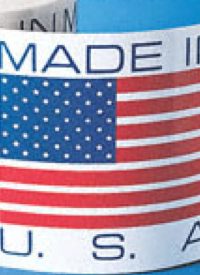
On Sunday, March 6, Christiane Amanpour, moderator of ABC’s This Week, continued the network’s series “Made in America.”
The topic is of immense importance to the United States, especially now as the country experiences huge job losses to outsourced manufacturing, increasing unemployment, a mounting trade deficit, and an unwieldy economy — but it is of special interest to Americans who for years have quietly sought out goods made in America.
ABC posed this question to the This Week Roundtable and to its viewers: “If each American spent just a bit more each week on American-made products, would it translate into more American jobs?”
Last week, the network examined the home of a typical American family who had claimed that it was important to buy American; however, when the family examined their product labels, they were startled to discover that most of the items in their home were made in other countries. ABC employees removed every foreign product from the home, leaving a single lamp made in the United States, and replaced the items with U.S. goods — proving that it is possible to have a totally American-made household. The only product that could not be replaced was the family’s computer. The only American-made appliances available were high-end brands such as Viking and SubZero; still — contrary to public perception — ABC found that in many cases, U.S.-made goods were less expensive.
The Roundtable was comprised of Amanpour’s colleague David Muir; Leo Gerard, President of United Steelworkers; Chrystia Freeland, editor-at-large for Thomson Reuters; and Mort Zuckerman, editor-in-chief of U.S. News.
Freeland led off the discussion by stating that it was not a good idea to try to isolate purchasing to one’s own country, because in her opinion global trade among nations helps the world’s economy.
Gerard countered by observing that the United States has had 25 record-breaking years of trade deficits, and has gone from being the world’s largest creditor to the largest debtor because the nation isn’t on a level playing field. He called for a manufacturing policy that would put America on an equal footing with other countries, adding that the government ought to be giving people tax breaks to bring jobs to the United States instead of tax breaks to move jobs overseas.
In regard to the level playing field, following the importation of dangerous products from China in 2008 — from contaminated animal feed, to lead in steel, and poison in children’s toys and products used for human consumption — Gerard said his union filed nine trade cases against China for sub-standard products, and has won them all. “Why have we won them? Because they cheat!” he declared, adding, “Low-priced goods have an expensive cost.”
Zuckerman remarked that America can’t compete with China on the basis of low-cost labor — that low-cost labor will never be America’s strength. He advised, “We should have a tax code that makes sense. Lower tax rates would create more opportunity in the U.S.”
Muir then elaborated on ABC’s findings after the week’s experiment with refurnishing a family home. “Economists say unanimously that you will help create jobs here if you buy American-made products,” he declared, adding that buying American won’t affect the global trade balance.
ABC’s report revealed that if each American would increase spending on U.S.-made products by just 18 cents per day, it would create 200,000 more American jobs.
So the answer to the network’s question, "Will increased spending on American goods would translate to more American jobs?" is yes. Then what is standing between American consumers and their buying U.S.-made products?
Senator John McCain was interviewed by Amanpour about the answers and agreed with President Obama’s idea that:
…innovation is the key to the U.S. being able to restore our economy and that’s got to be exports — we’ve got to have free trade agreements. I’m glad the President is supporting the South Korea free trade agreement. We’ve abandoned Columbia and Panama [—] all these countries are entering trade agreements and we’re being left behind. We have the ability to out-compete and out-innovate.
He also erroneously stated that iPads and iPhones are made in the United States, when in fact they are manufactured in China.
McCain’s convoluted logic that innovation equals exports is the same that landed the United States in the disastrous free trade agreement known as NAFTA. When it comes to a robust manufacturing base, trade agreements aren’t the answer.
He topped off his statements by noting that of the foreign students educated in the United States, most are returning to their countries and innovating there. “We need to keep the intellectual capabilities here,” he urged.
Many of ABC’s viewers wrote saying they’d accepted the network’s challenge of trying to buy American. The series apparently struck a nerve in the viewing public that is concerned about the economy and about American jobs. The network may have landed on a simple but time-tested underpinning of economic prosperity — in this case, anyway: demand for American products will create a supply of them.
The many patriotic Americans who have for decades carefully read labels and supported American businesses are finally being justified, and given a voice by the attention focused on this issue.
It is possible — and ultimately profitable — to Buy American.
Graphic: The logo of Made In USA!



